Uncovering the Next Generation's Hall of Fame

The Rock Hall Keeps Its Foot on the Gas
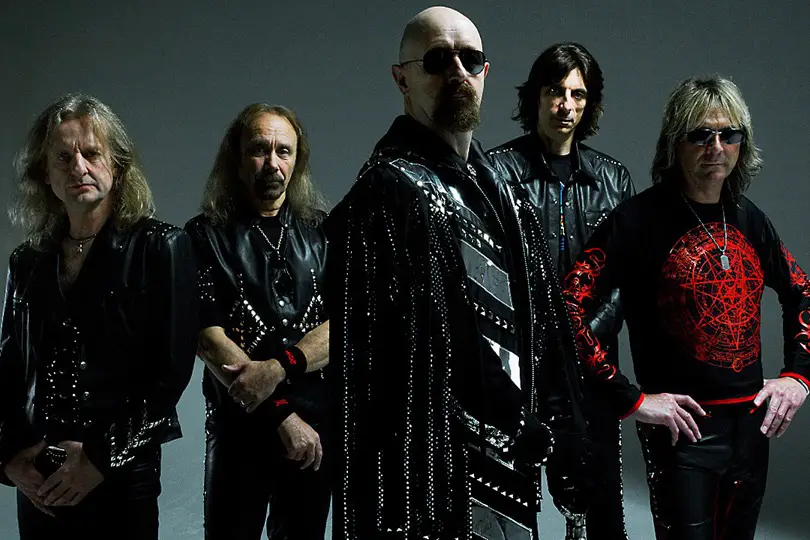
With the announcement of the Rock & Roll Hall of Fame's class of 2022 inductees, the institution has signaled once again that they are determined to make progress in reducing its lengthy backlog using large induction classes and liberal use of their special categories.
Performers
Among the Rock Hall's first 16 induction classes, 12 included seven or more performer inductees, but have only been that large three times since (2004, 2019, and 2022). The reduction of class sizes led to an ever-increasing backlog of artists who started becoming eligible based on their work in the late 70s, 80s, and now 90s, as the Hall worked its way through missing artists from the 60s and early 70s. Had the Rock Hall maintained larger classes, they would have been better able to keep up with the never-ending tide of qualified artists who become eligible every year.
This year's seven performers is a positive sign that they recognize the issue and are willing to increase the number of inductees (despite the protestations of the Induction Ceremony producers).
Dolly Parton's landmark induction as a country artist in the Performer category makes good on Rock Hall chairman John Sykes's promise last year that "all genres are welcome." Her induction now sets the stage for many other country icons that arguably should be honored, which as Dolly feared, will inevitably keep artists from the Rock Hall's core genres waiting longer, or left out altogether.
Special Categories
After LL Cool J jumped from the performer ballot to a broadened Musical Excellence category induction, it was clear that the Rock Hall nominators (and their subcommittees) were frustrated enough by the results from the voters that they felt they had to take matters into their own hands to clear the lane of significant, but unelectable artists. The side effect of inducting LL Cool J last year was likely a nomination for A Tribe Called Quest this year, an artist who had been eligible for years but hadn't had an opportunity because the Nominating Committee had dug in its heels trying to get LL in first. Likewise, the Nominating Committee's hands have been tied regarding hard rock and metal artists when a genre-defining band like Judas Priest was still on the outside. After three chances on the ballot, the Rock Hall decided the voters were probably never going to induct them, so they shifted them to Musical Excellence. We'll see the impact of this next year where Iron Maiden seems like the inevitable next in line, but after that things can get more interesting.
Why are some artists getting shuffled off the performer ballot and not others? LL Cool J, Judas Priest, and Kraftwerk (who went in via the Early Influence category) were all pioneers of their genres, whereas other multiple-nominated artists such as Chaka Khan, MC5, and Rage Against the Machine might have less clearcut cases (or the Hall just hasn't gotten to them yet? or perhaps they do better with the voters?). Needless to say, the category has very little boundaries and it's best not to attempt to define it with any consistent rules. Without knowing who is on the Special Category subcommittees (the Rock Hall won't say), it's very difficult to predict who they will favor year-to-year. There are so many better ways the Rock Hall could handle this problem, but they have chosen to take this particular brute force approach instead.
The last two years have provided evidence of a trend that the Rock Hall has a renewed interest in honoring significant pre-rock era artists like Charley Patton and Elizabeth Cotten. These types of inductions are always widely praised and do the Museum-side of the Rock Hall a service by helping them tell additional stories of the roots of rock and roll. Keep them coming.
The Non-Performer category inductions are notable this year for finally honoring a woman music executive in Sylvia Robinson. The Rock Hall still has a lot of work catch up work do in this area, but this was a terrific start.
With the selection of Allen Grubman, the Rock Hall is honoring their first lawyer (and hopefully last), but as one of the founders of the institution itself, Grubman gets a rightful pass.
The Induction Ceremony
The 2021 Induction Ceremony ran overtime (causing the cancellation of the all-star jam) when faced with the challenge of honoring 13 inductees, even though many of whom were either dead or didn't show up. Most of this year's 14 inductees are thankfully still around and active, and have all seemed grateful for the honor and would be expected to attend and/or perform. Producers will need to be even more creative just to keep the induction ceremony under five hours given the potential number of speeches and performances.
As expected, John Sykes moved the induction ceremony back to Los Angeles for the first time since 2013. The question remains whether or not it will come back to Cleveland as promised in 2023, or if the Hall will instead switch to a regular three year rotation including New York. Rock Hall Museum CEO Greg Harris told SiriusXM today that a set cadence hadn't been determined yet.
With a loaded Rock Hall class, Induction Ceremony ticket demand should be high, so it was unfortunate to see the Hall of Fame take the event out of NBA arenas and move it to a 7,100 seat theater (with a huge chunk of those set aside for VIPs). Due to the limited capacity, fans should expect to pay a premium if they want to see the ceremony in person, although the smaller venue will hopefully make for a better experience.
Why Lionel Richie and not The Commodores? The Inside Scoop on the 2022 Rock Hall Ballot
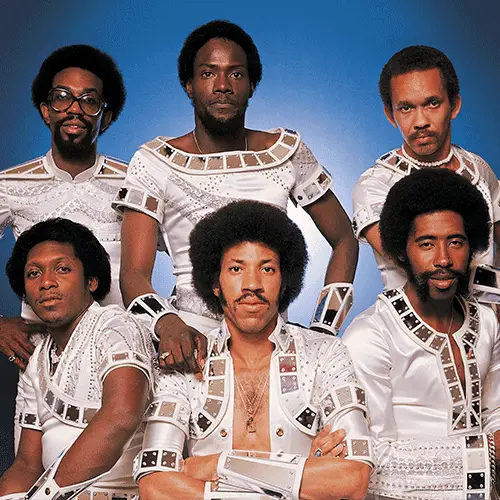
The day the 2022 Rock & Roll Hall of Fame ballot was announced, Nominating Committee member Alan Light appeared on SiriusXM to explain some of the thinking that went into the choices.
One of the more controversial nominees this year was Lionel Richie as a solo artist instead of Richie's previous group The Commodores. Alan Light explained the dilemma:
"We have kicked around in previous meetings, is it the Commodores, is it Lionel… What’s the right way to handle this? Maybe they’re more the funk band, does Lionel encompass that piece of his history, does that tell that story?
"I was thinking about Lionel.. There’s always that slot at Bonnaroo for the legacy headliner artist. They had McCartney, they had Elton, they had Billy Joel… and Lionel Richie was that slot one year. And I think he may be the only one in that slot that isn’t in the Rock Hall. And when you line him up.. Are you going to argue he’s on the level with Etlon and Billy, well when you put him in front of a crowd like that, it kind of feels like he’s in that altitude. He’s in that game. He’s got that sort of catalog, he’s got those sort of hits. People love him that much."
SIriusXM host Nik Carter also made a strong case for why The Commodores should be in. Alan Light responded:
"This is me speaking, not on the behalf of the committee. The icon of Lionel Richie has outstripped the status of the Commodores. That he is at that level of a familiar, and a celebrated, and a beloved name…I just think he jumped ahead on the line. I will certainly say that he’s got a better shot on the ballot than the Commodores would with the voting body.
"But if you’ve got to place your bets, you’re not putting them both on the ballot, you’ve got to put one on the ballot. I just think between American Idol host, writing “We are the World,” and all of the touchstones, he headlines at Bonnaroo, he’s that sort of a figure. I think it made an impact on people last year seeing the way people responded to Lionel when we saw him at the induction, he inducted Clarence Avant last year, and seeing the way the room and the other artists responded to Lionel Richie left an impact on those of us who were thinking of this stuff.
"You’re putting your chips somewhere, I just think if you’re advocating for him, if you’re advocating for that catalog, I think it’s a lot better shot with his name on that ballot in front of the whole voting body than the Commodores name would be."
Light had also mentioned he was not good at predicting who the voting body favors, but he obviously feels confident about the Nominating Committee's choice. While a Lionel Richie solo induction doesn't technically remove The Commodores from consideration, as we have seen with the Nile Rodgers / Chic situation, it seems likely their future induction chances would drop to almost zero.
Light also addressed the induction chances of the MC5 (6th nomination) and the New York Dolls (3rd nomination):
"It scares me to see the MC5 and the New York Dolls on the ballot. It scares me a little bit to see Duran Duran and Eurythmics on the ballot. Because when you have bands that are seen in a similar sort of lane [that can split votes]."
…
"The Hall of Fame continues to grow the voting body, bring other people into vote, younger people in, diverse voting body and everything else, but the biggest chunk of voters now who get this ballot and have to vote on this ballot are people in the Hall of Fame. People like the surviving members of Little Anthony & the Imperials, they’re like the 28 guys in Chicago, you know, there’s a lot of people getting this ballot, and no disrespect to people who are legendary artists, but who may not really know who the hell the New York Dolls and the MC5 are. And that’s a hurdle to get over. That is a challenge."
Alan Light on the expanded use of the special categories in 2021:
"The Hall was obviously more active, more aggressive in the non-ballot inductions last year. Putting in so many through the Early Influence and Musical Excellence and everybody seemed totally fine. LL went in as a Musical Excellence winner and gave the performance of the night, that’s what everybody walked away talking about and no one was like, “oh, but he didn’t really get in that way, he got in this way.” It was kind of liberating for the Hall to see, maybe we’ve got a freer hand to be able to, with people that have been nominated a bunch but don’t get in but we really think deserve it, to people that are a little more left of center or out of mainstream or whatever it is, I think we’re going to see more people going in through those doors than we have in years past. And I think that’s great, I think it worked great last year and we got a lot of worthy people in. And I wouldn’t be surprised if with some of these acts, like the [New York] Dolls, that ultimately is what ends up happening. I don’t know that that’s going to happen this year, but that wouldn’t surprise me."
Asked which two artists he put on the table at the meeting, Alan Light said he nominated Eminem and Mary J. Blige. On the question of why Eminem and not OutKast, Light responded:
"This was going to be the year that I was going to stand up and bang hard for OutKast, but on the one hand it’s obvious, but Eminem is a force that we cannot underestimate. The guy was the biggest selling artist from 2000-2010 in the world, and the third biggest selling artist between 2010-2020. That is a dominance that is a generational sort of impact. And 16 Grammys, and winning the Oscar for Lose Yourself, the impact across so many not just the rap audience but a rock audience. I said OutKast has got to wait because I don’t want to put those two, again I’m afraid of a split vote. I think it’s too much to say people would vote for OutKast and Eminem as two of their five. I’m still fighting for hip hop. I want to take the wins where I can get them. Like Eminem’s a win. Let’s do that and get him and double back. Because I want to continue to put in the deserving bodies where I see an opportunity to do that."
Two years ago, Light named Carol Kaye as the biggest Rock Hall snub. But despite the expanded use of the special categories, she's still on the outside. Inductees in the special categories should be announced with the performer winners in May.
Blurred Lines: The Rock Hall's Induction Categories Have Lost Their Meaning
After years of using its special categories sparingly, the Rock & Roll Hall of Fame expanded its scope this year by including seven inductees in three existing categories: Musical Excellence, Early Influence, and Non-Performer (Ahmet Ertegun Award). The changes surrounding the process have wide ranging implications for who they can honor in the future as well as who they will likely neglect.
First things first: It should go without saying, but all of these inductees are clearly Hall of Fame-worthy and any criticism of the Hall of Fame's process should not be construed as a criticism of the artists who have no control over the matter. Dramatically increasing the overall number of inductees this year was a major step in the right direction.
The following are the newly revised descriptions of the Performer, Musical Excellence, and Early Influence awards taken from the Rock Hall's website and press release for the 2021 inductees (in random order):
- [An award given to artists] whose originality and influence creating music have had a dramatic impact on music.
- [An award given to artists] whose music and performance style have directly influenced and helped inspire and evolve rock & roll and music that has impacted youth culture.
- [An award given to artists] who, in their careers, have created music whose originality, impact and influence has changed the course of rock & roll.
Do you know which description goes with each category?
Early Influence
The Rock Hall has been pushing the limits of the original intent of this category since at least 2009, when Elvis contemporary Wanda Jackson was honored as an "Early Influence" the same year she was on the Performer ballot. Despite testing the limits of the process, the category's original definition was clear:
"Artists whose music predated rock and roll but had an impact on the evolution of rock and roll and inspired rock’s leading artists."
The key words in that statement that makes it distinct from the definition of an artist in the Performer category is "predated rock and roll," generally considered the early 1950s. Fittingly, some of the first inductees in that category were names like Robert Johnson, Lead Belly, Bessie Smith, and Howlin' Wolf. Even after 35 years of inductions, the Rock Hall still has more foundational artists left to honor, as evidenced by this year's induction of Charley Patton, the "Father of the Delta Blues" who was born in 1891.
This year the Rock Hall decided to formally drop the "predates rock and roll" description altogether in favor of definition #2 above. As you might surmise from the generic category descriptions, there are no stated rules or timeframe for who might qualify as an "Early Influence."
Musical Excellence
This category evolved out of the Sidemen category, and was intended to broaden its definition to include producers. Here's how the Rock Hall described it in 2013:
"It honors those musicians, producers and others who have spent their careers out of the spotlight working with major artists on various parts of their recording and live careers. Though they often play a key role in the creation of memorable music, the public rarely knows them by name."
The category may have been expanded beyond studio sidemen (and yes, it was all men) at the urging of Elton John, who wanted to get his friend Leon Russell into the Hall of Fame. As a jack-of-all-trades, Russell did not fit neatly into the Performer or Sideman categories, so in 2011 he was honored in the new Musical Excellence category. The following year, the category was used to induct three recording engineers. After that, the Hall of Fame drifted further away from the behind the scenes roots of the category to induct the E Street Band (2014), Ringo Starr (2015), and Nile Rodgers (2017).
After Ringo was inducted, the Rock Hall revised the definition of the category to remove the "out of the spotlight" parts:
"This award honors musicians, songwriters and producers who have spent their life creating important and memorable music. Their originality, impact and influence have changed the course of music history. These artists have achieved the highest level of distinction that transcends time."
This year's definition (#1 above) is intended for "artists, musicians, songwriters and producers," and is so generic and inclusive, that again, it can apply to any of this year's inductees.
The Rock Hall hasn't inducted anyone considered a true "Sideman" since 2009. This is a huge missed opportunity for the Hall of Fame to spotlight the musicians who worked in the shadows and don't typically get the fame and fortune of the lead artists. If the Rock & Roll Hall of Fame isn't going to recognize them, who will?
The Rock Hall Nominating Committee has long been frustrated that the voters haven't found room on their ballots year after year to induct artists such as Kraftwerk, LL Cool J, Chaka Khan, MC5, and the J. Geils Band. Just as they did in 2017 when they gave up trying to get Chic inducted after 11 nominations and instead gave Nile Rodgers the Musical Excellence award, this year they decided to do the same with LL Cool J after he missed induction on the Performer ballot for the sixth time. Needless to say that voters have noticed this end-around of the induction process and are questioning why they received a ballot at all if the Rock Hall will just induct who they want anyway.
So how should the Rock Hall handle these issues? First, they should keep inducting large classes such as these. Having 13 inductees to help clear the backlog is the best thing the Rock Hall has done in years. However, it's fair to say that wedging artists into the wrong categories, or twisting category definitions so they become meaningless is not ideal. There are better options:
- Increase then number of Performer inductees every year. If special category inductions were the only alternative for larger classes, then sure, keep doing that, but the unwritten rule of inducting between 5 and 7 performers annually should be doubled.
- Expand the number of artists that voters can choose on their ballots. It's quite possible LL Cool J and/or Kraftwerk missed out because they were voters' sixth choice each year, or they suffered due to strategic voting patterns. Voters also tend to gravitate towards the new names on the ballot, so if you miss out in your first year, it becomes more difficult to get over the hump with voters, especially if they think you'll just be back on the ballot the next year.
- Create a rule where after a certain number of nominations, you are automatically inducted the following year, similar to the old "seven year rule." The Hall currently has two performer inductees who got in that way, and there are no asterisks to be found.
- Create a spot among the performers for a "Nominating Committee selection," that makes it feel like an honor to receive it, but announce it before the ballot goes out so it doesn't look like a consolation.
- The Rock Hall shouldn't have artists leap from the Performer ballot to one of the special categories in the same year. It's a bad look and it appears to be a consolation prize, rather than the special honor it should be. The Hall should have anticipated the scenario of LL Cool J missing out again (with Jay-Z on the ballot, his odds were going to be very low), and kept him off the performer ballot if they were going to induct him no matter the outcome. Ballot spots are precious and shouldn't be spent on artists who are getting inducted regardless of the vote tally.
- Provide some boundaries to the special categories. If you want to expand the definition of "Early Influence" to include more recent artists, that's fine, but give it a specific definition so new inductees fit in with the ones who have already been inducted in that category. All Hall of Famers are supposed be influential, so what makes the special category distinct?
- Better yet, create new categories that are specifically built to fill the holes in the current system. And yes, the Singles Category has been a disastrous attempt at doing this, but a more thoughtful solution is out there.
- If you create new categories, you can leave Early Influence for its original purpose of honoring artists who predate rock and roll. There is still so much left to do in that era, that expanding it now will inevitably neglect the artists it was created for. The same goes with the Musical Excellence award. Now that the category is being used to honor transcendent rock stars like LL Cool J and Randy Rhoads, will there be room to induct the "out of the spotlight" heroes?
- John Sykes alluded to the fact that there are new seven-member committees for each category. Do women have equal representation among the selectors? The fact that there are no women inductees in the special categories this year (and very few historically) should be cause for alarm for Sykes who has made increasing diversity on the Performer ballot a priority.
- As for this year's Musical Excellence inductees, LL Cool J should obviously be included in the Performer category. Billy Preston had a significant solo career in addition to his work as a sideman, and would not have been out of place on the regular ballot, and may have even gotten the votes to be inducted. Randy Rhoads is the ultimate lead guitarist, and not a behind-the-scenes backup musician. Ideally Rhoads would be inducted alongside Ozzy Osbourne as a Performer, but Ozzy hasn't been nominated yet (and now his chances have likely dropped even further now that Rhoads is already in).
- For the Early Influence inductees, Charley Patton obviously fits the original definition of the category. Kraftwerk and Gil Scott-Heron are both essential Hall of Famers, but don't fit with the previous inductees in the category. The Rock Hall should simply create a new "Modern Influences" category for these types of artists that have created genres that have helped perpetuate rock and roll into the 21st century. It's not too late to change it!
- If the Rock Hall continues down this path where any artist is eligible for Musical Excellence, it's going to become a problem. Already people are questioning why LL Cool J was chosen and not Chaka Khan/Rufus, who has been nominated just as many times. Why not MC5? Why not Judas Priest and Iron Maiden? Up until recently, the Rock Hall could simply tell artists and fans that they weren't in because they "didn't get the votes." Without a set of rules for the category, what's going to be their excuse now?
This year's induction class is overwhelmingly a net positive, so it's difficult to be too critical when there are so many great artists finally getting honored. The most prestigious awards carry with them a gravity because of the seriousness to the process. The Rock Hall's casual rewriting of its awards to solve its larger structural issues diminishes the clarity and logic of their inductions. How can you explain the story of a category which includes Hal Blaine, Cosimo Matassa, the E Street Band, Ringo Starr, and LL Cool J without talking yourself in circles?
Here’s Greg Harris trying to explain how LL Cool J wound up in the Musical Excellence category after being nominated as a performer six times: “As a process, I wouldn’t try and go too deeply with it.” #RockHall2021 pic.twitter.com/zuSwC7kJss
— Future Rock Legends (@futurerocklgnds) May 15, 2021
The John Sykes Era Begins with a Bang
With its 2021 class, the Rock & Roll Hall of Fame took a significant step in a new direction. The first induction class under chairman of the board John Sykes is notable for many reasons. Some quick thoughts on this year's class:
- The Hall inducted “the most diverse list of Inductees in the history of the organization,” according to the Hall’s own press release.This year has three performer inductees which include at least one woman, the most since 1996. Huge credit to Sykes for making this a priority with the Nominating Committee and then delivering.
- There are 13 artists this year, the Rock Hall’s largest class since 2012, and tied for the fifth largest class ever. With the massive backlog of worthy candidates in all genres and categories, seven inductees per year wasn’t cutting it, so this is an encouraging development.
- Welcome Tina Turner, Carole King, and Dave Grohl to the “Clyde McPhatter Club” for becoming two-time Hall of Fame inductees. That is the most new members added since 1997.
- The Rock Hall has abandoned the idea of a live ceremony (for now). There is inherently tension between the time constraints of an induction ceremony and the number of artists you can properly honor. By adding the even tighter limits of a live HBO ceremony, it apparently became too much for the Rock Hall to accept. Good for them for opting for more inductees and letting the ceremony run long.
- Kraftwerk finally gets in. Having been nominated six times since 2003 and topping a number of lists of the biggest snubs, Kraftwerk just couldn’t get over the hump with the Voting Committee. There was almost universal agreement of their importance, but the Rock Hall’s system was too broken to get them inducted as performers. So after floating the idea last year of expanding the meaning of the “Early Influence” category to include genre pioneers, rather than just pre-rock and roll era artists, the Rock Hall decided to go for it this year, inducting Kraftwerk and Gil Scott-Heron, both of whom released their first recordings in 1970. The Hall’s new definition of the category is so loose as to be meaningless, so the category can be used for anything moving forward.
- With the hip hop backlog quickly getting out of control, the Rock Hall decided it needed LL Cool J out of the way. Like Kraftwerk, the Rock Hall couldn’t find a way to induct him as a performer (his rightful category), so they decided to just induct him in the catch-all Musical Excellence category, which they have been using recently for artists who can’t get in on the performer ballot (Nile Rodgers) or using it to fast track an induction (Ringo Starr). It’s a major indictment of the Rock Hall’s induction system that they have to resort to these tactics to induct seminal artists like LL Cool J.
- Heavy metal gets an acknowledgement with the induction of Randy Rhoads. Metal fans are rightfully frustrated that obvious Hall of Fame-worthy artists like Judas Priest and Iron Maiden get passed over year after year. The induction of guitar legend Rhoads gives metal fans some small hope that the Rock Hall won’t completely abandon the genre.
- The induction categories somehow became more of a mess than they already were. The new descriptions in the press release are a meaningless word salad (more to come on this later). We have been critical of the Hall of Fame’s blurring the category lines since 2009 when Wanda Jackson jumped from the Performer ballot to an Early Influence inductee, but this year has a whole new “f*ck it” attitude emanating from the Rock Hall. Sure, the category distinctions don’t mean much to the casual fan, but this is the equivalent of a football player being enshrined in Canton as a coach, just because he gave an inspiring pre-game speech once.
- What the Rock Hall should have done is alter their system to allow Kraftwerk and LL Cool J to be inducted as performers with a “Nominating Committee Selection” footnote and be done with it. Destroying the meaning of the other categories to wedge in valid performers is completely ridiculous and undermines the reputation of the entire institution. This is undoubtedly John Sykes’s biggest mistake this year.
- After averaging less than two inductees in the “special” categories in recent years, the Rock Hall went all-in this year, with a whopping seven inductees in this class. In a year in which the Rock Hall has focused on diversity, they neglected to include any women among the seven inductees.
- The 2021 tally: 18 men and 7 women (28%). That increases the overall percentage of women in the Rock Hall by 0.5% up to 8.1%.
- If you can ignore the categories and how the artists were selected (which most people do anyway), this is a *fantastic* Rock Hall class that has something for everyone. The induction ceremony has the potential to be an all-time great.
- The Rock Hall now says they have over 1,200 voters, up from about 800 five years ago. For years they have been trying to diversify their Voting Committee, so it seems they are just adding hundreds of voters to dilute the power of their own inductees.
- John Sykes’s quote in the press release about the Hall honoring “artists whose music created the sound of youth culture” is a clunky rewording of the Motown Records motto “The Sound of Young America,” presumably to keep it from being U.S.-centric?
Follow us on Twitter here for the latest Rock & Roll Hall of Fame news and analysis.
The Rock Hall Singles Category is still a thing
The Rock & Roll Hall of Fame inducted five more songs into their Singles Category this year, despite not mentioning them in a press release or the televised induction special. The lack of information about the category prompted reporter Troy Smith to ask the Foundation about it in October. When asked specifically about the category, the Rock Hall Foundation said, "it is something that we preferred to have done live, so we are skipping it this year with the plan to return it next year.” The Foundation seemed to have forgotten that it had in fact selected five songs for induction in 2020 (they were printed in the souvenir book), and shortly after their denial added the singles to their website without any official announcement, beyond a wordless Tweet from one of the Museum's Vice Presidents.
— Jason Hanley (@jasonhanleyrock) October 30, 2020
The five songs selected are:
- Irma Thomas - "Time Is on My Side" (1964)
- Junior Walker & the All-Stars - "Shotgun" (1965)
- Sam the Sham & the Pharaohs - "Wooly Bully" (1965)
- The Troggs - "Wild Thing" (1966)
- The Box Tops - "The Letter" (1967)
On a recent episode of the podcast Who Cares About the Rock Hall? ceremony director/producer Joel Gallen was asked about the Singles Category's exclusion from the 2020 HBO induction special. He said that he had initially planned to include a short segment during a live ceremony, but after that was canceled, he was never asked to include it in the shortened induction special. Gallen was surprised to learn that the only premise of the category had been undermined in 2019:
Here’s the moment when the Joel Gallen (the Rock Hall ceremony producer/director) realizes the entire premise behind the Singles Category was undermined when an Isley Brothers song was selected last year. @rockhallpod pic.twitter.com/pM80YVXth8
— Future Rock Legends (@futurerocklgnds) November 21, 2020
The Rock Hall has already said they are continuing with the category in 2021, but by the way they continue to treat it, they make it easy to forget.
Stevie Van Zandt and the Singles Category
The future of the Rock & Roll Hall of Fame's Singles Category has been suspect since last year's induction ceremony segment announcing the honored songs was cut from HBO's broadcast. To cast further doubt on the viability of the category, the Rock Hall has been slow to display the inducted singles in the Museum and on the website (the songs are now listed on the site with their induction classes). There was also no mention of the category when the inductees were announced last week.
The category's sole champion to date has been Rock & Roll Hall of Fame Nominating Committee member Steven Van Zandt. This week he clarified the flexible criteria for the category in a tweet:
No real rules. Special songs from the soundtrack of our lives. Influential. Or important. Or fun. Mostly by artist that won’t get in but not always. Like a Rock Hall Jukebox. A few of us just pick em.
The Rock Hall describes the category with weightier (but still vague) language:
This category of recognition focuses on the songs which have established a permanence in our history and influenced rock and roll. These songs have had an immense cultural impact and merit a place in history.
So, songs could have "immense cultural impact" or just be "fun." Van Zandt will talk to a couple people and just pick a few songs to carve into history. Whatever. When literally thousands of songs meet the loose definition of the category, it effectively becomes a meaningless award.
Steven Van Zandt was recently interviewed by Brian Ives for Beasley Media to discuss the Rock Hall and his position serving on the Nominating Committee for 18 years:
Ives: You’ve advocated for a lot of legendary acts to be inducted into the Rock and Roll Hall of Fame: the Rascals, the Dave Clark Five, Darlene Love, the Hollies. But are you getting turned on to relatively younger bands, as groups like the Cure and Radiohead get inducted?
SVZ: I’m not opposed to checking things out. It’s just mostly they don’t speak to me. I don’t make a value judgment on it. I may not love something but that doesn’t mean it’s bad. It doesn’t mean they shouldn’t be in the Rock and Roll Hall of Fame. I got no problem with any of that. They might just not be something that necessarily speaks to me.
Like the bands I am still trying to get people into like Johnny Burnette and the Rock ‘n Roll Trio and Procol Harum, The J. Geils Band. I’m still trying to get into the basic obvious bands that should be in for historic reasons. The difference is, when it comes to the Radioheads and the Cures, and those kinds of bands, I tend to think more chronologically. It’s not that they shouldn’t be in, but I just think the ones that without whom they wouldn’t exist, we need to get them in first. These are the ones that really created this thing that we are all still making a living from, you know. That includes some doo-wop groups and others that should be in.
Van Zandt echoes some of the same frustrations that fellow NomCom member Seymour Stein did when lamenting that The Clovers, Connie Francis and Ivory Joe Hunter still couldn't get nominated.
Ives then asked Van Zandt about KISS's controversial exclusion:
Ives: I think that Tom Morello turned a lot of people’s heads with his speech at KISS’s induction. It was as passionate as his speeches about worker’s rights. I know a lot of people on the nominating committee had it in for KISS. Did any of that change, in your mind, when he made that speech?
SVZ: I liked them and I had seen them. I had happened to go, Doc [McGhee], the manager, called me to come down and check them out. For some reason, I had never seen them. And I went to a show. I thought this was like maybe 20 years ago. I was quite surprised by how many good songs they had. There was one good song after the other.
Now, a lot of these things have to do with context and perspective. When they came out we were all coming out of the Renaissance period of the ’50s and ’60s. We weren’t going to judge them the same way because that was at the beginning of the early ’70s and the beginning of the fragmentation [of rock and roll], and the beginning and the hybrids and theatricality and the beginning of so many things that were now going to go against tradition. Those of us who were traditionalists were not necessarily ready for it or put it into perspective. But you know 20-30 years later, I look at them compared to even groups of the ’80s and certainly in the ’90s. And you say, you know what, they had a bunch of really good songs. And they are great performers. So no, I had absolutely no problem with KISS going in.
Some people were a little bit upset about it. But you know it’s tough. It’s tough to get in that Hall of Fame. And I get very upset when people don’t show up for it.
Ives: Like Radiohead or the Sex Pistols.
SVZ: Yeah.. I don’t like it. It’s going to be the first line in your epitaph, man. You know what I mean?
A Brief History of the Rock & Roll Hall of Fame Induction Categories
Let’s take a look at the history of each of the four categories and which former designations are included in each:
- Performers (1986-present): This is the most straightforward of the categories and has gone unchanged since the Rock Hall’s inception. The description of the category at the museum states: “These inductees are the artists who have changed the world of rock with their mastery and artistic vision.” Notably, this is the only category in which inductees are chosen by the Voting Committee. Inductees in the other categories are selected by subsets of the Nominating Committee.
Ahmet Ertegun Award (2008-present): After Rock Hall co-founder Ahmet Ertegun died in 2006, the Non-Performer award was renamed in his honor. In previous years, there were two separate awards, one for Lifetime Achievement and one for Non-Performers, as evident in 1991, when Nesuhi Ertegun was given the Lifetime Achievement award and Dave Bartholomew and Ralph Bass were inducted as Non-Performers. The induction program noted the difference (see the photos below), and up until a few years ago, RockHall.com also made the distinction (they now blend the two categories into the Ahmet Ertegun award). To further confuse things, Jann Wenner was inducted in 2004 with the Lifetime Achievement Award in the Nonperformer Category.
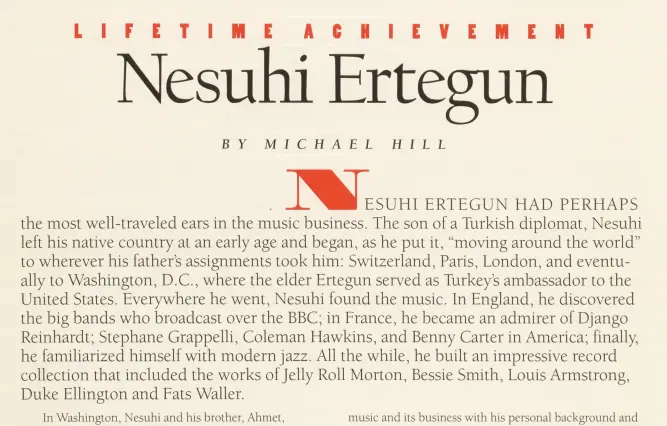
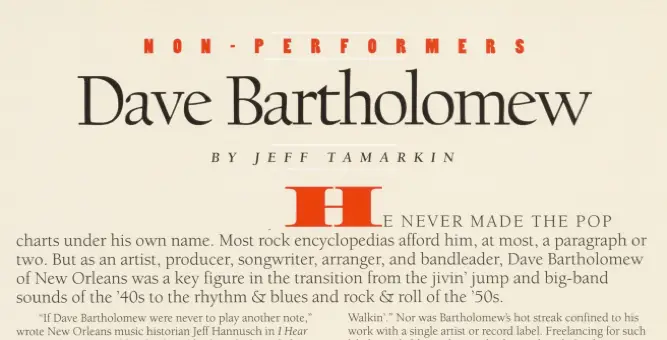
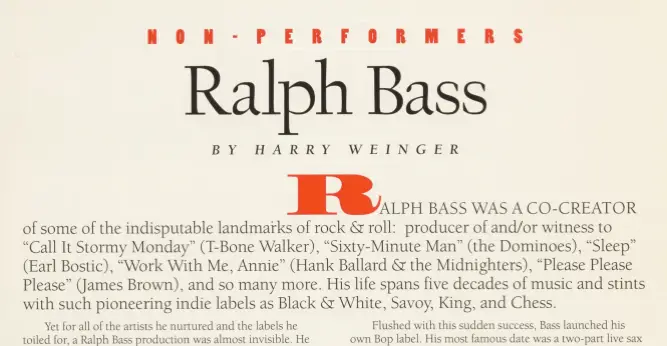
- Early Influence (1986-present): In the first induction class, this category was called “Forefathers and Early Influences.” Between 1987 and 1991, it was sometimes shortened to just “Forefathers,” even inducting Ma Rainey in that category in 1990. Since 1992, the category has been called “Early Influences,” but is only used sporadically.
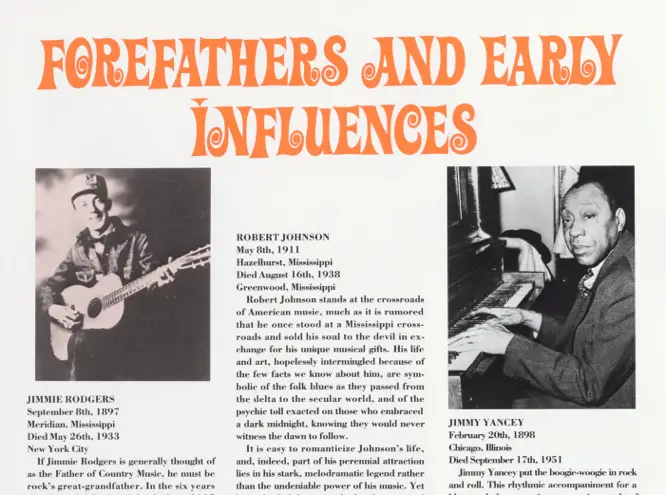
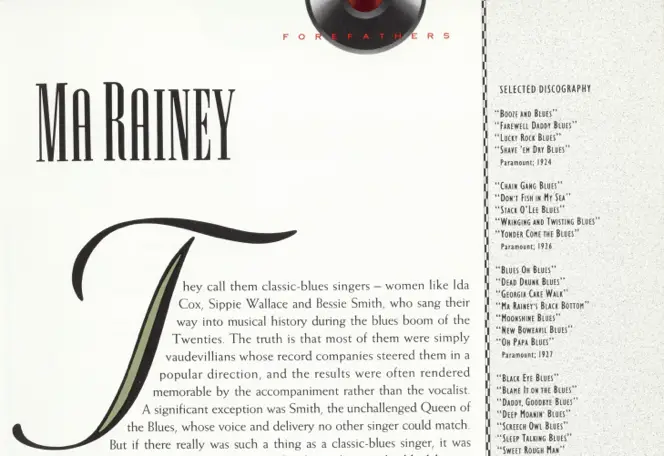
While the name of the Early Influences category eventually settled down, the definition slowly became more flexible. On RockHall.com, the category is still defined as “Honoring the artists that pre-date the birth of rock & roll, but have had a profound impact on music’s evolution and its iconic artists.” The only proscriptive criteria is that artists should pre-date rock & roll, generally considered to have begun in the early 1950s. That hasn’t stopped the Hall from inducting artists such as Wanda Jackson, Sister Rosetta Tharpe, and Freddie King, all of whom were first nominated in the Performer category before being inducted as Early Influences, despite the bulk of their careers occurring during the rock & roll era. Rock Hall Foundation President Joel Peresman recently suggested that the definition of the category be further expanded to potentially include influential genre-pioneers like Kraftwerk, who didn’t form until 1970.
- Award for Musical Excellence (2011-present): The Sideman category (2000-2009) was retired after the 2009 ceremony, and all 15 inductees have been folded into the Award for Musical Excellence category, which is an honor that is now used as a catch-all for “performers, songwriters and producers.” Never mind that performers have their own category and producers and songwriters have traditionally been inducted into the Non-Performers category. The Rock Hall has used this category as a way to induct artists like Leon Russell, the E Street Band, Ringo Starr, and Nile Rodgers, without having to go through the formality of putting them on the ballot that is sent to the voters.
This award was originally called the "Award for Recording Excellence" in 2011, but was changed to the current name in 2012.
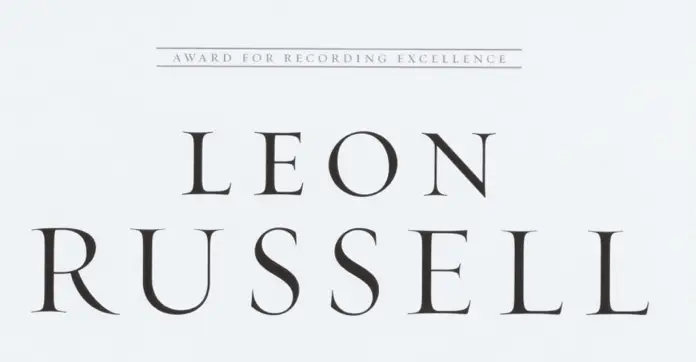
Singles (2018-2019?): This well-meaning category was initially created as a way to honor artists who had historically significant songs but generally would have been unable to get inducted as Performers under the current system. But in 2019, the Rock Hall inducted a song by a current inductee thereby throwing out its only rule for the category and making it meaningless. The Rock Hall Museum never embraced the Singles inductees with an exhibit and has now scrubbed any mention of them from their website. (January 2020 Update: The Singles have been added to the Rock Hall's website.) HBO didn’t broadcast the Singles segment of the Induction Ceremony in 2019, so this category may be toast.
The Rock & Roll Hall of Fame’s casual attitude towards its own history continues to be troubling. For an institution that has a robust Library & Archives, they are all too willing to change their own history, either by quietly inducting people after the induction ceremony or by omitting the names of inducted artists from their website and Hall of Fame wall that go unfixed for years. With their most recent website redesign, they removed valuable content that they had built over the years in favor of highlighting their online store and paid memberships. Hopefully some of the Museum’s talented curators can turn their attention to preserving the history of their own institution and live up to their “commitment to forever.”

About that "Singles Category"...
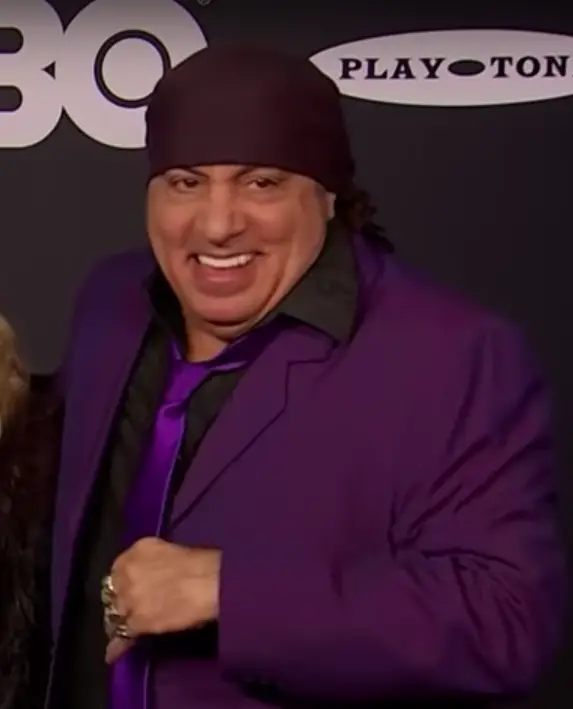
After the Rock Hall introduced the “Singles Category” at the 2018 ceremony there were no shortage of questions, criticism, and speculation about the purpose and future of the award. After all, the Rock Hall had previously published a list of the “500 Songs That Shaped Rock and Roll,” so how would this be different? Last year, Steven Van Zandt made clear to state that there was only one rule for a song to be honored: “the records are by artists not in the Rock Hall.” With that in mind, let’s take a look at the 2019 recipients*:
- The Chantels - "Maybe" (1957)**
- The Champs - "Tequila" (1958)
- Barrett Strong - "Money (That's What I Want)" (1959)
- The Shangri-Las - "Leader of the Pack" (1964)
- The Shadows of Knight - "Gloria" (1965)
- The Isley Brothers - "Twist and Shout" (1962)
The whole point of this category is that its artists that aren’t in. Bullshit.
— Who Cares About the Rock Hall? (@rockhallpod) March 30, 2019
As you probably know, the Isley Brothers are in the Hall of Fame, inducted in 1992. So in the second year of this brand new Rock Hall category, the one and only rule gets trashed.*** What are we even doing here?
The Rock Hall’s own website and museum have been slow to acknowledge the category after it was introduced as a surprise at last year’s ceremony. Greg Harris, the Museum’s president and CEO has tried to emphasize that the songs are not inducted into the Rock Hall, and “Singles” isn’t even a Hall of Fame category (what?). A year later, the museum still hasn’t accommodated the song list in its Hall of Fame exhibit (although Harris says the songs will eventually receive a special place of honor). It took months, but their website finally listed last year’s singles on the “Induction Process” page (but they weren’t actually inducted, right?), and hasn’t bothered to add this year’s winners, four weeks after the ceremony.
Just like last year, the artists of the honored songs were not in attendance at the Induction Ceremony, and according to a source close to one of the artists, weren’t even notified about the “honor” in advance.
In January, Joel Peresman, the Rock Hall Foundation’s President & CEO, who is theoretically in charge of this mess, said that this category “will be included again this year and always going forward.” Always! If that’s the case, someone needs to turn Steven Van Zandt’s vanity project into something meaningful. Otherwise, there’s really no point in discussing it further.
* - In his introduction, Steven Van Zandt said they don’t always select the original version of the singles, but they honor “the most iconic versions that time has proven to have had the biggest impact on the soundtrack of our lives.”
** - With this honor, it’s likely the Chantels won’t be back on the Performer ballot, where they had been twice been nominated. The other non-Hall of Famers have never been nominated.
*** - So, out of the hundreds of foundational songs to break the non-Hall of Famer rule, why “Twist and Shout”? It was written by Bert Berns, whom Van Zandt had gotten inducted in 2016. Just one more reason the entire system is broken.
Steven Van Zandt, of course, narrates the new Berns documentary and is a producer for the Broadway show about Berns. #RockHall2016
— Future Rock Legends (@futurerocklgnds) March 24, 2016
Rock Hall Creates New Honor for Singles

Just down the road stands the world’s leading institution celebrating the history of rock and roll. We stand here to honor the careers of musicians whose incredible work helped shape that story. But we all know the history of music can be changed by just one song, one record. In three minutes we suddenly enter a new direction, a movement, or a style. Experiencing that three minute song results in a personal revelation, an epiphany that significantly changes our lives. This year we are introducing a new category to the Rock Hall. We’re calling it the “Rock & Roll Hall of Fame Singles” as a recognition of the excellence of singles that changed rock & roll -- kind of a Rock Hall jukebox. The records are by artists not in the Rock Hall. Which is not to say these artists will never be in the Rock Hall, but just that they are not in the Rock Hall at this moment.Van Zandt then welcomed the first six singles into the Rock & Roll Hall of Fame:
- Jackie Brenston and his Delta Cats - "Rocket 88" (1951)
- Link Wray & His Ray Men - "Rumble" (1958)
- Chubby Checker - "The Twist" (1960)
- The Kingsmen - "Louie Louie" (1963)
- Procol Harum - "A Whiter Shade of Pale" (1967)
- Steppenwolf - "Born to Be Wild" (1968)
At first blush, this appears to be a new backdoor into the Rock Hall for artists who can’t get over the hump with the voters. The Rock Hall used similar methods to bypass their own Voting Committee to induct Sister Rosetta Tharpe, the “5” Royales, Freddie King, and Wanda Jackson as Early Influences, after they had each been on the ballot as Performers. Unlike Early Influence inductees, the newly honored Singles artists are still not Hall of Famers, so they could theoretically still be nominated, but it sure feels like the Rock Hall is trying to clear out some names from their growing backlog of candidates. We would be shocked to see any of these artists on the ballot next year.
At this point, there are still many more questions than answers, since the Rock Hall has yet to acknowledge this award on its website or in a press release. When they do provide some information, perhaps they can answer these questions:
- Why was this announced as a surprise at the ceremony? Wouldn’t announcing it in advance provide more exposure for these songs and artists?
- Were the honored artists and their families invited to the Induction Ceremony? Chubby Checker has been extremely vocal about his absence from the Hall of Fame, so it’s odd he wasn’t at the ceremony.
- Will songs be honored annually, or is this a one-time award?
- Will the artists honored in this category become members of the Voting Committee like other inductees?
- Who is on the committee that picked the first songs?
- How will these songs be recognized at the Museum? Will they be listed next to the other 2018 inductees on the signature wall?
- What are the eligibility rules for this category? Does a song have to be older than 25 years?
All of the honored songs are part of the Rock Hall’s 2004 list of the “500 Songs that Shaped Rock and Roll,” so it seems likely that future inducted singles will come from this list. There are over 220 songs left on that list from non-Hall of Famers, so it will take decades for them to honor them all if they continue with the category.
If we had to guess, Steven Van Zandt created this category out of his frustration that many seminal artists have little chance of ever being inducted, and he wanted to do something, anything, to honor them before it’s too late. While the intentions may be pure, the execution was ham-fisted at best. Not inviting the artists and their families to the ceremony, or even notifying them of the honor in advance, just seems sloppy and inconsiderate. The Rock Hall itself has created this situation by limiting the number of inductees to five or six per year while simultaneously lowering the bar by inducting marginal candidates. That generates even more artists who can genuinely be considered snubs who will never be inducted at the current pace.
There are lots of ways to address these problems, but the Rock Hall never seems willing to experiment with their induction system beyond force inducting artists into categories in which they don’t belong.
Why Freddie King's Induction as an Early Influence Makes a Mockery of the Entire Rock and Roll Hall of Fame Induction Process
Freddie King was one of the 15 performer nominees for the 2012 Rock and Roll Hall of Fame induction class. His name was on the ballot right between Joan Jett and Laura Nyro. His name was occupying one of the spaces on that ballot that dozens of other artists have been trying to be a part of for so many years and have been left out. You don’t think Deep Purple fans might have liked to see their name on the ballot there? They’ve never been nominated. Johnny Burnette & the Rock N Roll Trio? Nope. Stevie Ray Vaughan. Judas Priest. We could go on. The complaining wouldn’t be so loud if these artists ever even had a chance.
So why would the Rock and Roll Hall of Fame Nominating Committee waste a space on the ballot for an artist who was going to be inducted as an Early Influence anyway? (More on that in a second.) What does that say to the Voting Committee members who used one of their five precious votes on someone who was already in? Are you kidding? Don’t you think most voters would have liked to use that vote somewhere else? We bet War, the Spinners or Donna Summer would have liked those extra votes.
This really shouldn’t come as a surprise to anyone. The Rock Hall did the exact same thing three years ago with Wanda Jackson.
The reason the Rock and Roll Hall of Fame is so maddening to some of us is not because of who is in and who is out (that’s an entirely different discussion). It’s that the Rock Hall doesn’t even respect a defined process for induction. What other institution makes things up on the fly the way the Rock Hall does? Maybe the People’s Choice awards? Say what you want about the snubs of the Baseball or Football Halls of Fame (or even the Oscars), but you can’t say they don’t follow a set criteria and rules for induction.
Since 2005, the Rock Hall has honored five performer inductees every year. Since voters could choose up to five artists on their ballot, there was a logical symmetry between the ballot and the number of inductees. But this year, even though voters could still choose only five names, the Rock Hall decides to induct six artists. Why? Was it because one of the inductees is deceased (Laura Nyro)? No, they only inducted five in 2006 when Miles Davis was posthumously honored. So why are they inducting six this year? It feels like the system is being manipulated for some unstated reasons. The Rock Hall is certainly at liberty to change the rules, but does it need to be in the middle of the game?
And then there’s the issue of inducting Freddie King as an “Early Influence” -- an issue that came up the last time this happened with Wanda Jackson. The Rock Hall’s definition of the category from their website: “Artists whose music predated rock and roll but had an impact on the evolution of rock and roll and inspired rock’s leading artists.” The key part of that definition is that the music “predates rock and roll.” The rest of the definition applies to all Rock and Roll Hall of Famers. Both Freddie King and Wanda Jackson’s important works did not predate rock and roll by any definition. Wanda Jackson was a contemporary of Elvis. Freddie King had most of his hits in the ’60s. So, again, has the criteria changed?
And while we’re discussing the ballot, why were the Small Faces and the Faces nominated together? Yes, they overlapped band members, but so have many other bands over the years. We joked about this on Twitter when the nominations came out, but are we going to see joint Rage Against the Machine / Audioslave nominations? Pearl Jam / Mother Love Bone? Should Guns N’ Roses have waited to be nominated with Velvet Revolver? These are ridiculous examples, but the Small Faces / Faces has now set a precedent for this kind of thing. Bizarre. (Maybe the Baseball Hall of Fame will combine the stats of all of the Molina brothers and put them in the Hall of Fame together.)
Look, when you call yourself a “Hall of Fame,” that means something. It should be something for artists to aspire to achieve. It should deserve respect from fans. But you can’t continue to erode people’s confidence in the institution by bending the rules and looking the other way when there are obvious conflicts of interest without causing damage to your institution. Take a longer view of things. The Hall of Fame should become even more important as music becomes less of a communal experience.
We’re already looking at artists eligible for the 2037 induction ceremony. Will anyone still care?
The Unusual Induction of Wanda Jackson
Regarding the voting issue, the Cleveland Plain Dealer has the story:
In another curious subplot, Jackson is being inducted as an early influence, although she was nominated as a performer on the ballot.When Jackson didn't receive enough votes to get in as a performer, she was singled out for induction by a committee that handpicks early-influence honorees, said Joel Peresman, president and CEO of the Rock and Roll Hall of Fame Foundation.
Sidemen inductees are selected by a separate committee.
So, presumably if Jackson had received the votes to be inducted as a "Performer," she would have been gone in under that tag. Then they would have either appointed some other early influential artist or simply not use that category this year (which isn't uncommon). As commenter Philip pointed out in the comments, other artists have been nominated as performers and later inducted in other categories (Carole King as a "Non-Performer"; King Curtis as a "Sideman"), but never has it happened in the same year. If Wanda Jackson was going to be inducted whether she won or lost the vote, then why bother taking up that valuable spot on the ballot with her name?
As to whether or not Wanda Jackson belongs in the "Early Influence" category at all, let's look at the Rock and Roll Hall of Fame's description of that award.
Artists whose music predated rock and roll but had an impact on the evolution of rock and roll and inspired rock’s leading artists.Rock and roll's origins can be traced to the years just prior to the time when Jackson's career began in 1954. Wanda Jackson got her start nearly the same time Elvis Presley did, so it is strange that she is considered an "early influence" under the Rock Hall's own definition.